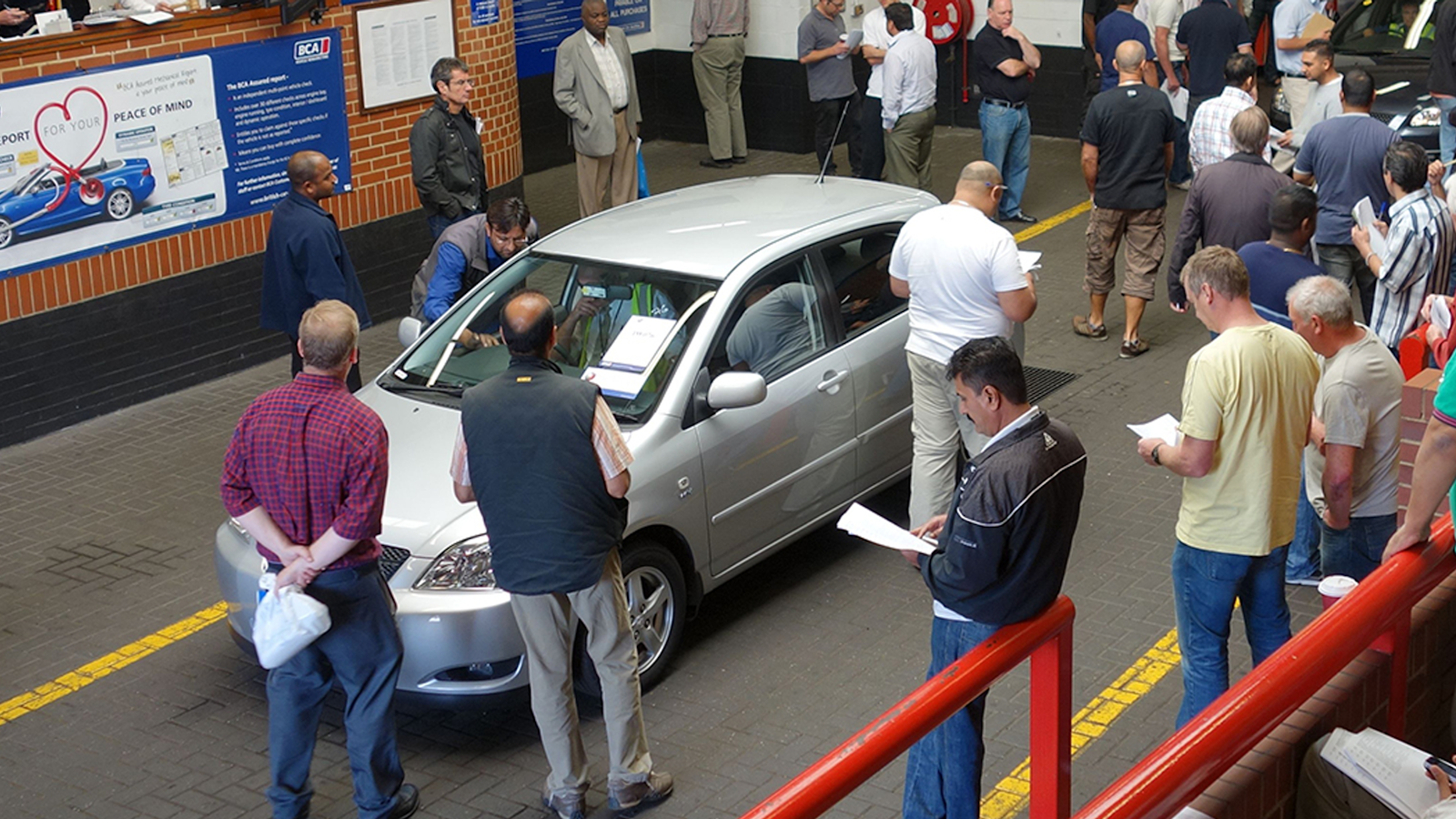The best ways to sell a car in 2026
July 22, 2025 by Siobhan Doyle

Looking for the best way to sell your car? Whether you’re exploring trusted places to sell cars or wondering where to sell a car quickly and easily, we’ve got you covered. Here are the five best ways to sell your car.
- Selling your car through Carwow
- Selling your car privately
- Selling your car to a dealership
- Selling your car at auction
- Selling your car to a scrapyard
Remember, you can sell your car here on Carwow. We’re here to help you through every step of your car-changing journey.
1. Selling your car through Carwow
Car buying websites such as Carwow offer a quick and easy way to sell your car for a fair price with minimal hassle.
Once you’ve shared all the details and photos of your car, you’ll agree on a reserve price. Then, your car goes into an online auction where hundreds of trusted dealers can place bids.
The dealer with the best offer will get in touch to arrange collection, payment, and even help settle any outstanding finance if needed.
The entire process is faster than selling privately or at auction, often completed within a few days.
Pros of selling your car to a car buying website
- You can get a valuation of your car without leaving the house.
- You’re guaranteed to sell your car at a time to suit you.
- You can get multiple quotes from different websites to make sure you get the best price. Nine out of 10 people who sold their car thought Carwow’s Sell My Car service got the price they expected, or more.
Cons of selling your car to a car buying website
- Different websites may offer different amounts, so it’s wise to get multiple quotes.
- Offers can be lowered if damage or repairs are found during inspection.
- You usually have little room to haggle once the offer is made.
Tips for selling your car to a car buying website
- Get multiple quotes to compare offers and find the best price.
- Provide accurate details and clear photos to get a fair initial valuation.
- Be honest about any damage or issues to avoid surprises during inspection.
- Choose a reputable website with good reviews and clear terms.
- Understand the payment process and timelines before you agree to sell.
2. Selling your car privately
Selling your car privately is often the best way to get the most money, and it’s easy to do through platforms such as Facebook Marketplace, Gumtree, or eBay Motors.
Start by cleaning the car, fixing minor issues, and gathering documents such as the V5C logbook, service history, and all keys. Create an honest listing with clear photos and a fair price. Be ready to respond to inquiries, arrange viewings, and possibly offer test drives – just make sure the buyer is insured.
Once you agree on a price, complete the V5C to transfer ownership (online or by post), and hand over the paperwork and keys. Private sales typically take anywhere from a few days to a few weeks, depending on demand and how well you market the car.

Pros of selling your car privately
- You can often get more money by selling directly to buyers without dealer fees.
- You set the price, negotiate terms, and choose who to sell to.
- You can sell it when it suits you, without pressure from dealerships.
Cons of selling your car privately
- Managing inquiries, viewings, and negotiations can be very time-consuming.
- Meeting strangers and allowing test drivers carries some risk.
- It may take weeks to find a buyer, with no certainty of a quick sale.
Tips for selling your car privately
- Wash, vacuum, and fix minor issues. Gather service records, title, and registration.
- Use clear photos and write an honest, detailed description.
- Meet buyers in public places, bring someone with you, and allow test drives only with a valid licence.
- Always complete a bill of sale, sign over the title correctly, remove the licence plates, and immediately notify the DVLA to avoid future liability.
3. Selling your car to a dealership
Selling your car to a dealer is a good option if you want a quick, hassle-free sale. You can simply book an appointment for an appraisal. The dealer will then inspect your car and give you a valuation.
If your car is on finance, most dealers will still buy it, so long as the car’s value is higher than the remaining balance. They’ll settle the outstanding finance directly and pay you the difference. For example, if your car is valued at £10,000 and you owe £4,000, you’ll receive £6,000.

Pros of selling your car to a dealership
- You don’t need to take time out of your day to arrange viewings and test drives.
- You may be able to get a good price if your car meets the ‘approved used’ standards or is in high demand.
- You’re less likely to be scammed than if you sell privately, especially if you approach a reputable dealer.
Cons of selling your car to a dealership
- The price you get won’t be as good as it would be if you sold it privately.
- A dealer will buy your car at the trade price, meaning they’re leaving a margin for them to prepare it and sell it on for a profit.
- If you want to change your cars, you’re limited to the cars that are available at the dealership.
Tips for selling your car to a dealership
- Get multiple offers from different dealerships.
- Sell at the right time (we’d recommend in the first quarter of the year and at the end of the month).
- Be honest about your car’s condition.
- Watch out for hidden feed such as reconditioning or admin charges.
- Get everything in writing before finalising the deal.
Part exchange your car with a dealership
Part exchanging your car at a dealership is a simple way to lower the cost of your next car. Instead of selling your old car privately, you hand it over to the dealer, who subtracts its value from the price of the new car.
The dealer will inspect your car and give you a valuation. For example, if the car you want costs £15,000 and your trade-in is worth £5,000, you’ll pay £10,000. If there’s outstanding finance on your car, that amount is deducted from the valuation.
The process is usually quick – often completed in a single visit. Appraisals take 15-30 minutes, and if everything is in order, you can sometimes drive away the same day. Be sure to bring your logbook (V5C), MOT certificate, service history, keys, ID, and any finance settlement details.
Overall, part exchange is a fast, hassle-free way to switch cars and save money upfront.
4. Selling your car at auction
Selling your car at auction is a way to show it off to a lot of potential buyers at the same time. Your car is shown to a room of people who then bid for it, with the highest bidder getting the car.
When you enter your car into an auction, you can set a ‘reserve price’. This is basically the minimum price you’re willing to accept. If your reserve price isn’t met, you’re given the option to accept the highest bid or take the car home again
The whole process, from entering your car to receiving payment, typically takes a few days to a week, depending on the auction schedule and how quickly payment is processed.

Pros of selling your car at auction
- You sell your car quickly by literally putting it in front of lots of potential buyers.
- It’s over and done in a day; there’s no waiting around for people to come to view the car.
- You can set a reserve price, which is the minimum amount you’re willing to accept for the car – this gives you some control over how much you get, though the car won’t sell if bidding doesn’t reach that amount.
Cons of selling your car at auction
- If you do sell the car, the auction house will charge you fees.
- Preparing your car for auction can take time – there’s paperwork, researching the best auction house, and arranging transport for both you and your car.
- If your car doesn’t meet the reserve price or doesn’t attract bids, you may leave empty-handed, meaning the trip and effort could feel wasted.
Tips for selling your car at auction
- Choose an auction house with a good reputation and with buyers interested in your type of car.
- Set a realistic reserve price to avoid a no sale.
- Arrive early so you can give yourself time to check in and get familiar with the auction process.
- Be honest about any faults or damage to avoid disputes later.
- Be ready to negotiate or accept offers close to your reserve.
5. Selling your car to a scrapyard
To sell a car to a scrapyard, contact local scrapyards or use online services to get a quote based on your car’s condition. You’ll need to provide details such as the make, model, year, and whether it runs. Once you agree on a price, arrange for drop-off or a scrap car collection.
The process is often completed within a day or two, especially if you use a scrap collection service.
Pros of selling your car to a scrapyard
- Selling to a scrapyard is a quick way to get rid of your car and earn some money.
- Many authorised scrapyards (Authorised Treatment Facilities) offer free car collection services.
- Usually, scrapyards don’t charge you to take your car – often, they pay you instead.
Cons of selling your car to a scrapyard
- You might need to deliver the car yourself, which can be inconvenient if it’s not running or you don’t have transport.
- The payout is usually low, often just a few hundred pounds, since the car is sold for scrap value.
- Prices are mostly fixed based on scrap metal rates, so there’s little room to get a better deal.
Tips for selling your car to a scrapyard
- Contact several scrapyards to compare offers.
- Bring your V5C registration document and ID for a smooth process.
- Make sure the scrapyard is licensed and follows legal scrap procedures.
- There’s no harm in asking about collection as some scrapyards offer free car pickup. This will be useful if the car isn’t drivable.
Car change? Carwow!
Looking for a new set of wheels? With Carwow you can sell your car quickly and for a fair price – as well as find great offers on your next one. Whether you’re looking to buy a car brand new, are after something used or you want to explore car leasing options, Carwow is your one stop shop for new car deals.
Click here to follow us on WhatsApp, where you can keep up-to-date with all the latest news, reviews, advice guides and videos.















